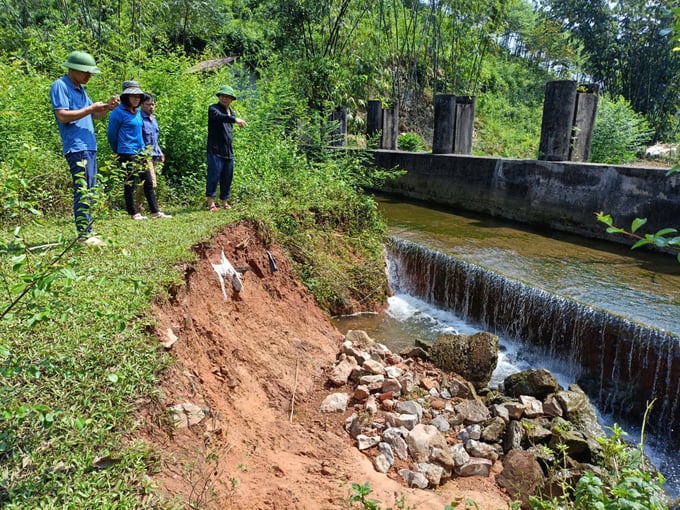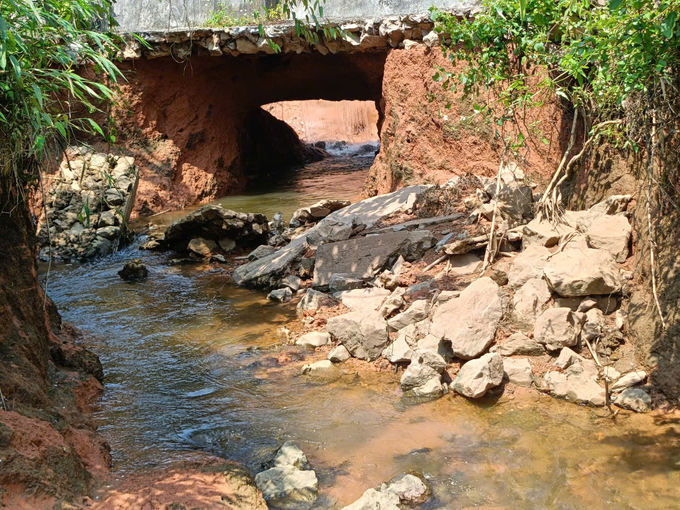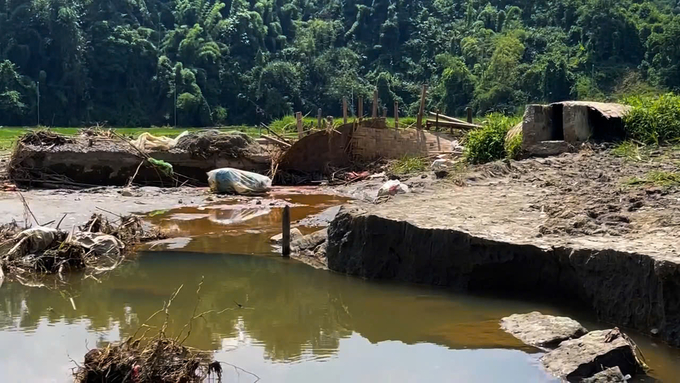November 27, 2025 | 01:54 GMT +7
November 27, 2025 | 01:54 GMT +7
Hotline: 0913.378.918
November 27, 2025 | 01:54 GMT +7
Hotline: 0913.378.918
The circulation of Typhoon No. 3 caused heavy rains and floods in many mountainous areas in the North, including Yen Bai province. This locality recorded nearly 300 collapsed, eroded, and silted irrigation works and had to request the Central Government to support funding for repairs.
The Phai Mon irrigation project in Thach Luong commune, Nghia Lo town (Yen Bai) includes a concrete gravity dam and a 68.46 km long canal system. During the heavy rain and floods after Typhoon No. 3, the discharge of floodwater from the upstream hydropower plant on Nam Tang stream caused the erosion of a 70 m long stream bank, the concrete canal bank was broken and at risk of prolonged damage.

Nearly 300 irrigation works in Yen Bai province were damaged by floods. Photo: Thanh Tien.
Do Xuan Thanh, an officer of Tan Phu Company Limited (the unit managing and operating the Phai Mon irrigation project), said, “For now, the company will only divert water from the auxiliary dam to provide clean water for the people. The temporary plan is to build a new canal approximately 30 m long inside the landslide area to divert water for production. In the long term, we recommend that the State invest capital to build embankments to prevent landslides, ensuring the safety of the dam and the canal system”.

The dam of Khe Tham Lake project was breached due to heavy rain and floods, causing water loss. Photo: Thanh Tien.
The Khe Tham reservoir project in Thuong Bang La commune, Van Chan district includes a head dam and a canal system over 5 km long. It supplies water to three irrigation works (Phai Dong Sang, Phai Tham and Phai Buu), irrigating nearly 70 ha of double-crop rice, more than 35 ha of vegetables and an aquaculture area. It was also damaged by floods.
“This project was invested many years ago, some items have degraded, and the recent floods have made the damage even more serious. The spillway has eroded, the spillway body is punctured, affecting the water storage capacity in the lake.
“Tan Phu Company Limited has a plan to place concrete walls deep into the spillway and the hole in the dam body. But this is only a short-term solution. After research and survey, we will propose to the leaders of Yen Bai province for further investment in solid upgrades, ensuring safety", said Do Xuan Thanh.
For generations, the rice fields of Thanh Van commune (Cho Moi district, Bac Kan province) have been fertile land and revered as the local “rice granary”, until Typhoon Yagi arrived. The waters flooded the fields, turning the fields into a mottled picture, dotted with green and patches of withered grass. Green fields were now bare of rocks and gravel, with layers of thick red mud on top.
Na Lech dam has a system of canals that flow through every corner of Thanh Van commune's fields, irrigating more than 5 ha of rice fields. After Typhoon No. 3, floodwaters and rocks rushed in, and when the water receded, Na Lech Dam was left with scars. The entire dam was buried, eroded, and canals were broken and swept away by the floodwaters. Local farmers are trying to save the fields that have just been devastated by the flood, but the dam is gone, so even after repair, there is no source of irrigation water.

Na Lech dam and canal in Thanh Van commune (Cho Moi district, Bac Kan province) were completely damaged in the recent flood. Photo: Ngoc Tu.
According to Dao Thi Nguyet, Deputy Director of Irrigation Exploitation Bac Kan Company Limited, the company currently manages 390 works (33 reservoirs, 342 dams and 15 pumping stations), and the impact of Typhoon No. 3 alone was immense with 39 works damaged. Meanwhile, the company's revenue is only over VND 10 billion/year, just enough to pay salaries. There are very few resources to endure the costs of maintenance and repair of works.
Particularly due to the impact of Typhoon No. 3, heavy rain caused landslides and buried the constructions. Many works were damaged, and some of them need a large amount of funding to repair. The company requested the province to pay keen attention and allocate resources to repair the constructions, maintain machinery and equipment to ensure the constructions can develop their capacity and serve the people's lives.
Considering the whole Bac Kan province, the flood caused 90 irrigation works to be buried or eroded. 210m of embankment was destroyed, and 6 clean water works were damaged. The total damage amounted to tens of billions of VND, which is a huge number for a province with difficulties like Bac Kan. In the short term, Bac Kan province will hardly have enough funds to repair these works, directly affecting agricultural production and the supply of domestic water for people.
Yen Bai province has proposed that the Prime Minister, ministries and branches under Central support the province with nearly VND 1,800 billion to restore agricultural and forestry production, invest in repairing and constructing essential infrastructure works such as transportation, education, health care, irrigation, clean water supply and emergency resettlement projects.
Translated by Samuel Pham

(VAN) The Mekong River Commission adopts the 2026 - 2030 Strategic Plan with a people-centered approach.
/2025/11/26/1720-1-200855_132.jpg)
(VAN) Viet Nam and Japan have many conditions to expand cooperation on climate change adaptation, particularly in disaster risk management based on advanced technologies.

(VAN) The strong development of digital technology and artificial intelligence is opening up opportunities to transform science and technology into a 'Magic eye' for disaster forecasting and early warning.

Applying vaccines and proactive disease prevention helps pig herds stay healthy, maintain productivity, reduce risks, and decrease reliance on antibiotics in modern livestock farming.

(VAN) Many advanced agricultural technologies and products were shared at the Viet Nam - South Korea Agricultural Technology Introduction, Trade Promotion, and Connection Seminar 2025.

(VAN) Minister Tran Duc Thang hopes to strengthen connections and exchanges with China in agriculture and environment sector through the Embassy of Vietnam in Beijing.

(VAN) After 50 years of strategic cooperation, Viet Nam and UNICEF remain committed to promoting fair and inclusive development for all children in the digital future.